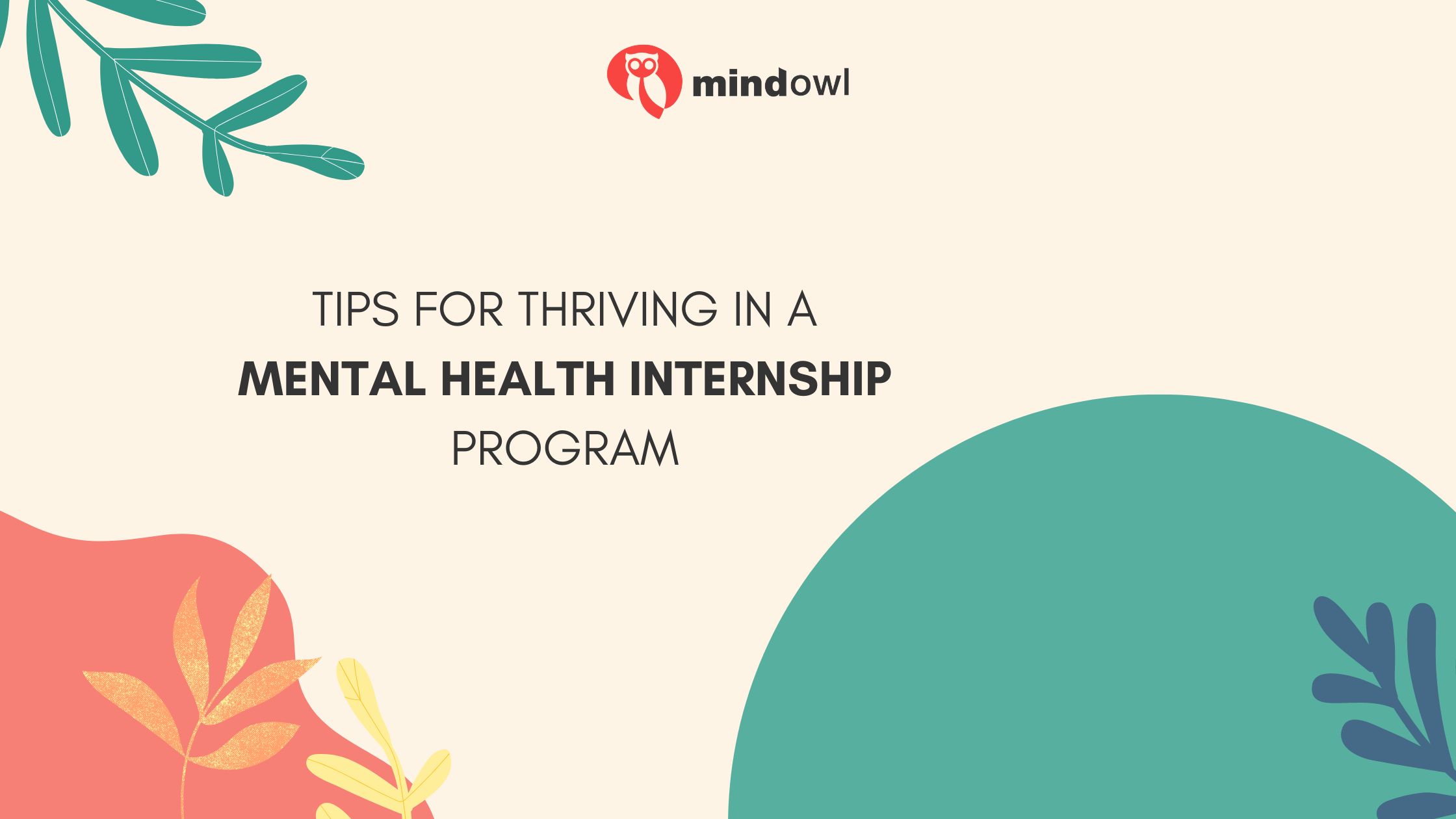Starting a mental health internship can be an exciting and life-changing experience, but it also comes with its share of challenges. This practical guide aims to help aspiring mental health professionals with valuable insights and useful tips to successfully navigate the internship journey.

Mental Health Internship Opportunities
Mental health internship opportunities are hands-on training that is invaluable for gaining real-world experience, developing crucial skills, and exploring potential career paths within the mental health field.
Here are some ways you can make the most out of this experience and thrive in a mental health internship program:
Cultivate Resilience and Adaptability
A mental health internship can be emotionally and mentally demanding. You may encounter challenging situations, vicarious trauma, or burnout. Cultivating resilience and adaptability is essential for navigating these obstacles and maintaining a healthy mindset.
So, develop coping strategies to manage stress and emotional impact, such as practicing mindfulness or seeking peer support. Learn to embrace flexibility and adapt to changing circumstances, too, as the mental health field often requires quick thinking and adaptability.
Additionally, remember to celebrate small wins and acknowledge your progress along the way. Recognize that personal growth and development take time, and be patient with yourself as you navigate this journey.
Establish a Solid Self-Care Routine
As mentioned, mental health internships can be tough. You’re helping others, which is awesome, but it can also take a lot out of you emotionally. That’s why taking care of yourself is super important. Think of it like this: you can’t pour from an empty cup, right?
So, how do you fill your cup? This is where self-care comes in. It’s all about doing things that make you feel good, mind, body, and soul. Maybe it’s hitting the gym, trying some meditation, or just chilling out with a good book. Whatever it is, find some activities you enjoy and make them a regular part of your routine.
Remember, it’s okay to ask for help too. If you’re feeling overwhelmed, talk to your supervisor, a counselor, or a friend you trust. They’ve all been there, and they’ll be happy to support you.
Get Support From Others
Mental health internships can be a rollercoaster, but you don’t have to ride it alone! Having a good support system is key. These are the people you can lean on, vent to, and get a pep talk from when you need it.
Start by building connections with the other interns – you’re all in the same boat. Chat with your supervisors, too; they’ve probably been through similar experiences. Plus, there are tons of online communities and groups for mental health professionals. These can be great places to connect with others who understand what you’re going through, swap stories, and maybe even find some cool job leads down the line. Remember, the more people you have in your corner, the better.
Embrace a Growth Mindset
A mental health internship is a learning experience, and it’s natural to encounter situations that challenge your existing knowledge and skills. Approach these opportunities with a growth mindset, embracing the belief that abilities can be developed through dedication and hard work.
Moreover, be open to constructive feedback from supervisors and colleagues and view setbacks or mistakes as valuable learning opportunities. Continuously seek out ways to improve, whether through additional training, self-study, or actively seeking guidance from experts.
Develop Cultural Competence
In the field of mental health, cultural competence is crucial. You’ll encounter individuals from diverse backgrounds, each with their unique perspectives, beliefs, and experiences. That said, aim to develop a deep understanding and appreciation for cultural differences.
Here are some ways you can work on enhancing your cultural competence:
- Educate yourself on various cultural norms, beliefs, and practices.
- Engage in open and respectful dialogue with clients and colleagues from different backgrounds.
- Attend workshops and seminars, or seek out resources that can deepen your understanding of cultural diversity. This knowledge will enable you to provide more inclusive and effective support to clients from all walks of life.
Furthermore, it’s crucial to examine your own biases and assumptions. Reflect on how your personal experiences and cultural background may influence your perceptions and approach to mental health care. By fostering cultural humility and a willingness to learn, you’ll be better equipped to navigate cross-cultural interactions with sensitivity and respect.
Develop Essential Clinical Skills
A mental health internship provides a unique opportunity to develop and refine essential clinical skills under the guidance of experienced professionals. So, seek out opportunities to practice and enhance your skills in areas such as:
- Active Listening: Cultivate the ability to listen attentively, without judgment, and with empathy. This skill is crucial for building trust and understanding with clients.
- Effective Communication: Learn effective communication techniques that foster a safe and supportive environment for clients to express themselves freely.
- Assessment and Diagnosis: Develop proficiency in conducting comprehensive assessments, gathering relevant information, and formulating accurate diagnoses.
- Treatment Planning: Gain experience in developing individualized treatment plans that address clients’ specific needs and goals.
- Intervention Techniques: Familiarize yourself with various evidence-based interventions and therapeutic approaches and practice applying them under supervision.
- Documentation: Master the art of maintaining accurate and comprehensive clinical records, adhering to ethical and legal guidelines.
Remember, skill development is an ongoing process. So, embrace a spirit of continuous learning, and don’t hesitate to ask questions or seek guidance from your supervisors and mentors.
Moreover, it’s essential to strike a balance between developing technical skills and cultivating the softer, interpersonal aspects of mental health care. Empathy, patience, and the ability to build genuine therapeutic relationships are just as crucial as clinical expertise.

Hone Your Time Management Skills
Effective time management is a critical skill for thriving in a mental health internship. You’ll likely juggle multiple responsibilities, such as client sessions, documentation, supervision meetings, and continuing education requirements. That said, develop strategies to prioritize tasks, manage your schedule effectively, and maintain a healthy work-life balance.
Consider using tools like calendars, to-do lists, or productivity apps to stay organized and on top of deadlines. Learn to set realistic expectations for yourself, too, and avoid overcommitting. When faced with competing demands, communicate openly with your supervisor or colleagues to ensure that essential tasks are prioritized appropriately.
Furthermore, develop the ability to be present and focused during client sessions. This means learning to compartmentalize distractions and fully engaging with the individual in front of you. This level of presence not only enhances the therapeutic relationship but also allows you to make the most of the limited time you have with each client.
Embrace Ethical and Professional Conduct
Ethical and professional conduct is the foundation of the mental health field. As an intern, you’ll have access to sensitive and confidential information, making it imperative to uphold the highest standards of ethics and professionalism.
It’s also important to familiarize yourself with the relevant codes of ethics and professional guidelines that govern the mental health profession. Understand the principles of confidentiality, informed consent, and boundaries in the therapeutic relationship. Seek guidance from your supervisor or experienced colleagues when faced with ethical dilemmas or gray areas.
Additionally, strive to maintain a professional demeanor in all interactions, whether with clients, colleagues, or supervisors. Dress appropriately, communicate respectfully, and maintain appropriate boundaries. Remember, your actions and conduct reflect not only on you but also on the organization you represent and the mental health profession as a whole.
Seek Mentorship And Supervision
One of the most valuable aspects of a mental health internship is the opportunity to learn from experienced professionals. That said, actively seek out mentorship and supervision opportunities to accelerate your growth and development.
A mentor can give you guidance and insights from their own experiences and offer objective perspectives to overcome challenges. They can also serve as a sounding board for your professional goals and career aspirations.
Similarly, regular supervision sessions with a qualified supervisor are essential for ensuring that you’re providing ethical and effective care to clients. Use these sessions to discuss challenging cases, receive feedback on your clinical skills, and identify areas for improvement.
Approach mentorship and supervision with an open mind and a willingness to learn. Be receptive to constructive criticism and feedback and use it as an opportunity to enhance your knowledge and skills.
Embrace Continuous Learning
A mental health internship is just the beginning of a lifelong journey of learning and professional development. So, approach this experience with a mindset of curiosity and a willingness to embrace continuous learning.
Seek out opportunities to expand your knowledge and skills beyond the requirements of your internship program. You can attend workshops, conferences, or seminars that pique your interest. Engage in discussions with colleagues and professionals from diverse backgrounds to gain new perspectives, too.
Furthermore, cultivate the habit of self-reflection. Regularly evaluate your strengths, areas for improvement, and personal growth throughout the internship experience. You can also keep a journal or participate in peer reflection groups to process your experiences and gain insights into your professional development.
Embracing continuous learning will not only enrich your internship experience but also lay the foundation for a fulfilling and rewarding career in the mental health field.
Collaborate With Other Professionals
Mental health care often involves collaboration with professionals from various disciplines, such as social workers, psychologists, psychiatrists, and other healthcare providers. That said, look at interprofessional collaboration as an opportunity to learn from diverse perspectives and provide holistic, comprehensive care to clients.
During your internship, seek out opportunities to work alongside professionals from different disciplines. Attend team meetings, case conferences, or interdisciplinary treatment planning sessions. Moreover, observe and learn from the unique approaches and expertise of each professional.
Honing effective communication and teamwork skills is also crucial. Learn to articulate your ideas clearly, actively listen to others, and find common ground when addressing complex cases or treatment plans.
By embracing interprofessional collaboration, you’ll not only gain a deeper understanding of the multifaceted nature of mental health care but also develop valuable skills that will serve you well throughout your career.
Final Thoughts
Thriving in a mental health internship requires a combination of dedication, resilience, and a commitment to continuous learning and personal growth. By embracing the strategies outlined in this guide, you’ll be well-equipped to navigate the challenges and opportunities that arise during your internship journey.
Remember, this experience is a stepping stone towards a rewarding and fulfilling career in the mental health field, where you’ll have the privilege of making a profound impact on the lives of those you serve.
MindOwl Founder – My own struggles in life have led me to this path of understanding the human condition. I graduated with a bachelor’s degree in philosophy before completing a master’s degree in psychology at Regent’s University London. I then completed a postgraduate diploma in philosophical counselling before being trained in ACT (Acceptance and commitment therapy).
I’ve spent the last eight years studying the encounter of meditative practices with modern psychology.

